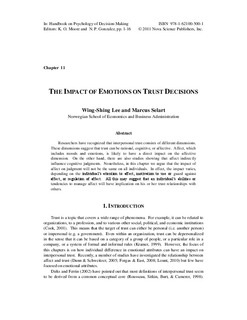| dc.contributor.author | Selart, Marcus | |
| dc.contributor.author | Lee, Wing Shing | |
| dc.date.accessioned | 2014-04-20T13:50:32Z | |
| dc.date.accessioned | 2014-12-18T07:07:16Z | |
| dc.date.available | 2014-04-20T13:50:32Z | |
| dc.date.available | 2014-12-18T07:07:16Z | |
| dc.date.issued | 2012 | |
| dc.identifier.citation | Moore, Karen O; Gonzales, Nancy P [Eds.] Handbook on Psychology of Decision-Making: New Research, Nova Science Publishers, Inc., 2012 | nb_NO |
| dc.identifier.isbn | 978-1-62100-500-1 | |
| dc.identifier.uri | http://hdl.handle.net/11250/227696 | |
| dc.description | © 2011 Nova Science Publishers, Inc.
Permission from publisher | nb_NO |
| dc.description.abstract | Researchers have recognized that interpersonal trust consists of different dimensions.
These dimensions suggest that trust can be rational, cognitive, or affective. Affect, which
includes moods and emotions, is likely to have a direct impact on the affective
dimension. On the other hand, there are also studies showing that affect indirec
tly
influence cognitive judgments. Nonetheless, in this chapter we argue that the impact of
affect on judgment will not be the same on all individuals. In effect, th
e impact varies,
depending on the
individual‟s attention to affect, motivation to use or
guard against
affect, or regulation of affect. All this may suggest that an individual‟s abilities or
tendencies to manage affect will have implication on his or her trust relationships with
others. | nb_NO |
| dc.language.iso | eng | nb_NO |
| dc.publisher | Nova Science Publishers, Inc. | nb_NO |
| dc.title | The Impact of Emotions on Trust Decisions | nb_NO |
| dc.type | Chapter | nb_NO |
| dc.date.updated | 2014-04-20T13:50:32Z | |
| dc.source.pagenumber | 1-16 | nb_NO |
| dc.identifier.cristin | 1002099 | |
